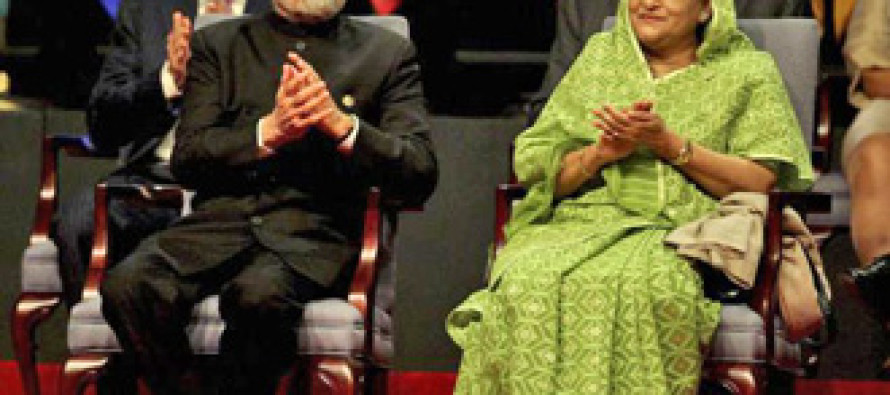Prime Minister’s Visit to India: Mutual Trust Restored

Bangladesh Prime Minister Sheikh Hasina’s landmark four-day visit (10-14th January) to India has created an excellent environment of mutual trust that will lay foundations to a much more stable and fruitful relationship with India.
What was lacking was mutual trust between the two neighbours and the visit has been successful in restoring the spirit of trust between the countries
It has to be realised that all bilateral issues cannot be resolved during the visit. What the visit has achieved is the direction to which bilateral relations are likely to move forward and a- 51-paragraph joint commuique has described many proposed aspirations, intentions and actions of both countries in improving their bilateral ties in various areas.
Festering bilateral issues, such as implementation of land boundary agreement, sea boundary and watersharing of common rivers have been mentioned in the joint communique for mutually acceptable solution.
Apart from the agreements signed coupled with trade facilitation measures and $1 billion credit for infrastructural development in Bangladesh, the declaration at the Indian Prime Minister’s level at the joint communique that India would not take any steps on the Tipaimukh project that would adversely impact on Bangladesh (paragraph 31) demonstrates that India is sensitive to Bangladesh’s concerns.
Furthermore following factors among others deserve mention ushering in a new chapter of relations:
• The installation of the Awami League and the Congress Party to power with the large mandate from people in the two countries in 2009 created a congenial ambience to settle the long-standing issues through productive negotiations because of the historic links between the two parties since the 1971 Bangladesh Liberation War.
• India has realised that it is India’s strategic interest to cooperate with Bangladesh if it wants to stabilise the insurgency in northeast India. India is fully aware that continued insurgency is a potential ground for foreign powers to complicate the situation.
• The Naxalites in Darjeeling have reportedly joined their hands with Maoists and can create difficulties in the “chicken neck” of land route from West Bengal to Assam and movement of goods and people from one part of India to the other part will be possible by air transport..
• India has also understood that a disgruntled Bangladesh may create difficulties for India becoming a global power because the image of India is likely to be tarnished in international comunity if it is arrogant and insensitive by keeping bilateral issues unresolved.
• Cross-border relations have deteriorated in recent years. New Delhi has often accused Dhaka of providing shelter to militant groups active in India’s northeast.
• The Hasina government has adopted tough stances to militants and hiding Indian insurgents or separatists in the country. India’s primarcy concern is security for the notheastern states and Bangladesh’s actions has convinced India that Bangladesh is determined to eliminate terrorist and separatist elements in all shapes and manifestations from its soil. The action has generated a tremendous India’s goodwill toward the Sheikh Hasina government
• Bangladesh, on the other hand, has to live with a reality that the country cannot remain insular or shut its borders from developments in India and China and Bangladesh must explore the advantages of its geographical position for its benefits.
• Cooperation among states is the hallmark of 21st century because no single country can address the human security challenges confronted by South Asian countries
The use of geographical and resource endowments has been the key to peace and prosperity and the eastern region of South Asia including Bangladesh will flourish most when its economy is integrated to the region and the rest of the world. The flow of trade and investment in Bangladesh is interlinked with interconnectivity by multi-modal transport within the eastern region, namely Bangladesh, Bhutan, Nepal and northeastern states of India.
It needs to be understood the gains in each and every case are unlikely to be equal for both countries. Bangladesh may gain more than India in some areas and reverse might be the case in other areas for India. It is a challenge to the skill in negotiations to make it a “win-win” situation for two countries.
Bangladesh Prime Minister has conceived addressing major issues through regional cooperation and Bangladesh may lead the way towards that goal.
She has emphasized the need for interconnectivity within the region and Bangladesh has become a party to the Asian Highway Network, proposed by ESCAP. She also proposes to build a deep seaport near Cox’s Bazar, a gate way to the Bay of Bengal, which may be used by all neighbours and China.
Both Bangladesh and India have now established a broad framework in which political, economic, social and environmental concerns could be sorted out amicably within a definite time-framework. The momentum must not be lost and bureaucratic obstacles must not jeopardise it.
India needs Bangladesh as much as Bangladesh needs India in the current regional and global environment. Indo-Bangladesh relations have moved on a mature and dependable partnership with the visit of Sheikh Hasina to India.
By Barrister Harun ur Rashid
Former Bangladesh Ambassador to the UN, Geneva


